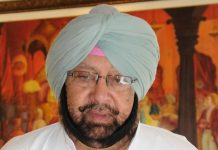 Have you noticed that we no longer talk of spouses’ role in the lives of the political who’s who. Strange or not really. I do realise that a high percentage of marriages are crumbling, but even if intact it’s the social sites which play the decisive role in the very survival graphs of the modern day kings and the king- makers of this country! Nah, not the wives! And then, to top it all, we continue to talk and over-talk of women empowerment and whatever goes along with it!
Have you noticed that we no longer talk of spouses’ role in the lives of the political who’s who. Strange or not really. I do realise that a high percentage of marriages are crumbling, but even if intact it’s the social sites which play the decisive role in the very survival graphs of the modern day kings and the king- makers of this country! Nah, not the wives! And then, to top it all, we continue to talk and over-talk of women empowerment and whatever goes along with it!
Thankfully there existed a definite period in the recent history of our country when wives did play a prominent role in the political struggles of their husbands. In fact, what’s prompted me into writing this is this recently launched book on Kasturba Gandhi- Kasturba Gandhi — A bio-fiction. Published by Niyogi Books, written by Giriraj Kishore, it’s been translated from Hindi by Manisha Chaudhry. It’s a 424 pages volume and I read it at one go. You could say I simply flowed along with the flow, as it’s brilliantly written. Deftly woven and inter-woven are facts and all those significant incidents from the lives and times of Kasturba Gandhi and her husband, Mahatma Gandhi, and family.
You could describe this volume as the fictionalised biography of Kasturba Gandhi but I would go ahead and call it a historical novel which ought to be introduced as the school and college levels, so that this upcoming generation can grasp the role played by Kasturba Gandhi not just in the life of her husband but also in the bigger and wider context.
“Her personality has a vastness of its own. Ba was a fighter, both in life and in politics.” Not to be overlooked is the fact that Kasturba Gandhi or Ba, as she was popularly called, was the first Indian woman who voluntarily faced a jail sentence in a foreign soil — in South Africa- in her fight for basic rights for Indian women.
Of course, not to be bypassed the determined way in which she took on and fought for the causes and pledges started by her husband when he was jailed in India. She was his companion and partner in all his struggles. Standing by him and with him all through.
There are several touching incidents detailed in this volume…perhaps, the most hitting is the last chapter carrying details to Kasturba’s passing away in jail — in the Agha Khan Palace — where she was last jailed.
To quote, “On February 23, her body was placed for public view. About hundred and fifty friends and relatives had come. Hindus, Muslims, Parsis, politicians and Britishers — people from all communities were arriving. The pyre was burning when Ramdas arrived. He wished his father and sat cross-legged on the floor. He was reserved. That night, Ramdas and Devdas had permission to stay in the Palace. As the two brothers sat by Bapu, their eyes flowed with tears. Bapu placed his hands on their shoulders. ‘For me it was partnership of sixty-two years. Sometimes I would think if both of us went together…but death keeps her secrets and takes everybody separately. I had prayed that if we cannot go together, take Kastur first. I will manage, but how will she live after having lived with a man like me…? Work tires you out but parting and sorrow almost kill you with the strain …’”
And as I went through several other recently released volumes on our historical past and the personalities that came along, the role of the spouse was held high. To quote from the latest book on Mughal Emperor Jahangir – ‘An Intimate Portrait of a Great Mughal Jahangir’(Juggernaut) author Parvati Sharma writes- “Nurjahan’s influence, then, is irrefutable. Its causes are less clear. Is it possible that Jahangir lost his heart and his head so completely to his wife that he gave away all the power he had so long craved? Or is it possible that Nurjahan had such a flair for governance that Jahangir found it both convenient and advantageous to share his rule with her? Could it also be, perhaps, that as the emperor lost more and more of his oldest and trusted friends, he became increasingly reliant on those that remained?”
♦ ♦ ♦
And in this particular volume – Yasodhara- A Novel About The Buddha’s Wife (Speaking Tiger), which was launched last summer, there is focus on the emotional pain in the life of Yasodhara.
As the author Vanessa R Sasson detailed during the course of an interview — “The pain is indeed immense. I felt her pain and sometimes felt as though I was getting lost in it. I had a very difficult time relating to the Buddha for a while as a result. I could not understand his behavior, his selfishness. But with time, that passed. I began to understand not just her pain, but the pain that is life’s complexity. The pain of the story does not belong exclusively to her. Everyone suffered — the kingdom, the king, the horse Kanthaka, the chariot driver, the ministers. His decision to leave home broke everyone’s heart. And because of that, I had to imagine that it also broke his. It was the only way I could come to terms with the story. I could not relate to a Buddha who walked away without a second glance. I had to imagine his pain, imagine the torture he must have experienced as he negotiated the call he felt himself pulled to follow. He had the best possible life, with the most loving companion. It had to have been painful for him to leave, as much as it was painful for her to be left behind.”
♦ ♦ ♦
Alas! Today, in these developed times, we no longer talk of the role of the spouse in the life and times of the who’s who!













